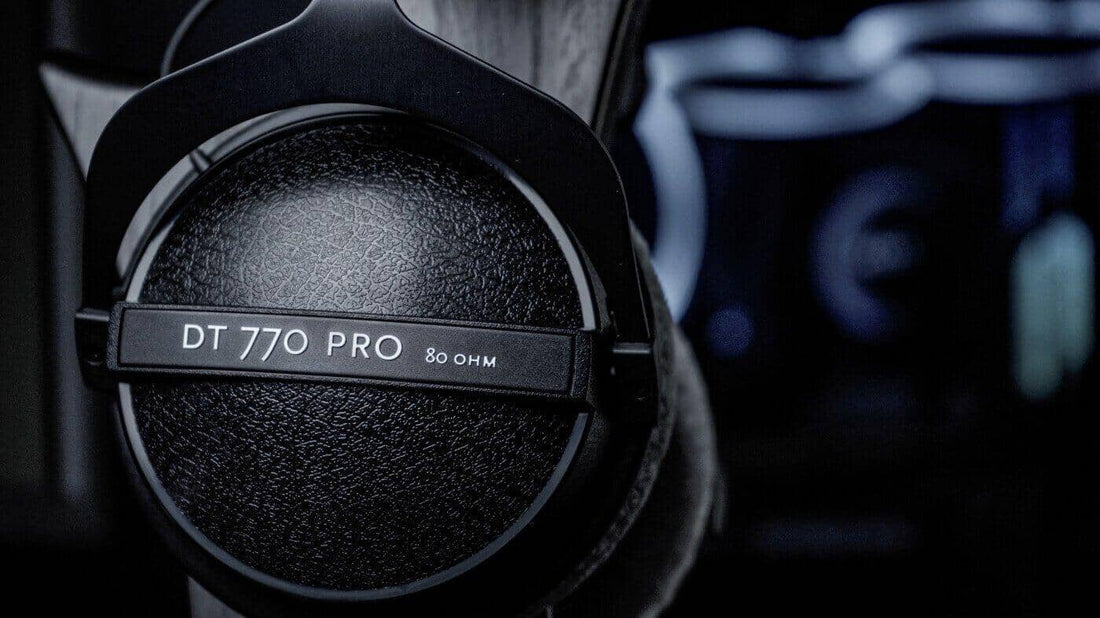Beyerdynamic DT770 Pro (80 ohm) Review - Beyer's Finest?

DT770 Pro Review
Written by Chrono
Introduction
The Beyerdynamic DT770 Pro is a headphone that's been around for a very long time, and it's likely one that needs no introduction. In case you need a refresher on the basics of this classic set, though, the DT770 Pro is a closed-back, dynamic driver headphone that'll set you back around $150 if you're interested in buying one today.
The reason why I'm covering this headphone now in 2022 is because it's a headphone that I've been using extensively for other content I've been working on recently, and while listening to it I realized that I've never reviewed it despite it being one of the headphones I've listened to most extensively. In fact, looking back on my audio journey and experience, this was one of the first headphones that really got me into the hobby--I was listening to it way before I even listened to the LCD-2, the headphone I first wrote a review about. So, in this article I'll share my experience with the DT770 Pro and why it's a headphone that I've grown quite fond of!
Sources and Music Used in Listening Tests
The Amplifier/DACs used in this review were the SPL Phonitor XE (with built-in DAC), Benchmark HPA4 + Burson Composer 3X Performance DAC, Grace Design SDAC + A90 , and the JDS Labs Element II connected via USB to my desktop computer. For the listening tests I used music from a wide variety of genres including Rock, Jazz, Classical, Acoustic, Hip-Hop, and latin. I played tracks from my own FLAC library as well as from Qobuz streaming service played via Roon (exclusive mode).
Beyerdynamic DT770 Pro - Product Summary
- Reasons to buy
- Great Price for Performance
- Comfortable to Wear
- Built like a Tank
- Reasons not to buy
- V-Shaped Tuning Could be Harsh for Some
- Cable is Non-Dettachable
Accessories

For accessories there's really not much to cover, though I suppose that that is not too surprising for a headphone in this price range. Packaged alongside the DT770 Pro is a 3.5mm to 1/4" adapter, and a Beyerdynamic travel baggy. There's also the standard set of paperwork if you're into that stuff, but that's about it.
Build & Comfort
I've always been a really big fan of the build and design of Beyerdynamic's DT headphones. For $150 you're getting one of the most durable-feeling headphones that you can get out there. They're not the most premium-looking, but they're built like tanks, and they use a good mix of metal and really sturdy plastic elements.

Despite using metal components, however, it's an extremely lightweight headphone at 270g, which contributes to the great level of comfort that the DT770 Pro provides. Admittedly when they're fresh out of the box they're a little on the clampy side, but the headband does ease up after about a week of use making them quite comfy. As is always the case with Beyerdyamic headphones, I feel like I must also mention that the pads are some of the comfiest out there--the velour they use one these pads is undoubtedly second to none.
Sound
When I think of headphones around this price bracket, some of the headphones that come to mind are things like the AKG K371, the HE400SE, or the HD58X. However, the performance of the DT770 Pro--in my opinion--far outshines that of those other headphones I've mentioned, and is closer to headphones like the HD600, or the HiFiMan Sundara.
First Impressions
Well, as I just mentioned what I think I notice first about the DT770 Pro is that it has performance that punches well above its price bracket. Then, there's its V-shaped tuning which, despite not being a tonality I normally seek or gravitate to, works quite well in this headphone and I can enjoy without EQ because neither of the elevated registers is outrageously exaggerated; it's surprisingly balanced-sounding with present mids (not very common for a v-shaped headphone).

Bass
One of the key strengths of the DT770 Pro's bass response is that it has fantastic sub bass extension, reaching all the way to 20hz easily, with little-to-no roll-off; you get a lot of depth and rumble in that sub-100hz region of the frequency response. This profoundness in the bass is further assisted by the fact that the DT770 Pro also has a rather generous bass shelf. It's a little more boosted under 120hz than what I'd consider to be neutral-sounding, but it's not overly aggressive and it's definitely something that I think bass enthusiasts will appreciate.
Towards the mid-bass, there is a narrow bump between what to me sounds like 130-180hz, which provides an additional sense of kick and warmth to that region. What I find nice about the bass here, though, is that despite these boosts to the bass, the bass-to-midrange transition is smooth without any muddying or bloating in the lower mids. So, while it is a more present bass shelf than what, for example, the 2018 Harman Target Preference Curve would suggest, it's a bass response that I'd say is very fun and clean--it doesn't really mess with other frequency bands.
Mids
Despite having an overarching V-shaped tuning, the midrange on the DT770 Pro does not feel subdued and there's really not much for me to say here. The mids are linear throughout, they feel very natural-sounding, they have a natural timbre to them. The only thing I really noticed was that after EQ'ing, there's a bit of a dip at around 4KHz making the presence region a tiny bit lacking in presence, but this was very subtle. Overall, I'd say that this is what I'd consider to be a reference midrange tonality, it actually reminds me quite a bit of the kind of midrange tuning you get on something like the HD600 or HD800S.
Highs
Beyerdynamic is of course infamous for its treble tunings as they tend to be synonymous with sibilance, and while the DT770 Pro also has a treble range that feels artificially brightened with a slight bit of sibilance, it's far from being the most aggressive I've heard from Beyerdynamic--I find it to be tolerable, and not harsh or fatiguing like on the DT990 Pro.
I believe that the reason for this is is that unlike the DT990 or the DT1990 Pro which have really narrow and disruptive peaks in the treble, the DT770 Pro has a really broad elevation between 5.5-8.5K. In my experience what this introduced was some lower treble glare and sibilance, but again, I didn't find it to be painful to listen to like on some of the other Beyer's--just something to keep in mind if you're very treble sensitive.
Love our in-depth reviews?
We test and review hundreds of headphones every year. Sign up to get the latest news, reviews, guides, and more in your inbox. Join the 60,000+ like-minded audio lovers who love our newsletter!
Resolution
Despite coming in at around $150, I think that the DT770 Pro's detail retrieval is really closer to headphones that are quite a bit more expensive, such as the HD600 and Sundara. It creates a pristine image of the music that makes a for a really good introduction to the nuanced kind of experience that Hi-Fi headphones can offer.

Soundstage, Imaging, and Layering
Another quality that I've always appreciated in Beyerdynamic headphones is their soundstage presentation, and that remains true for the DT770 Pro in spite of the fact that it's a closed-back headphone. The presentation on the DT770 Pro is actually quite spacious, and independent of price range, there's actually very few closed-back headphones that I can think of that are able to produce a more spacious soundstage; I think only headphones like the HD820 or ZMF Verite Closed surpass it when it comes to creating a sense of distance. Additionally, like all other Beyerdyamic headphones I've tried, the DT770 Pro has pin-point accurate imaging that is excellent at delineating the positioning of sound. The one quality I find lacking in their spatial presentation is that the instrument separation they provide isn't the most impressive, it's one aspect where it's noticeably behind headphones like the HD600 or Sundara, and I do think that it slightly detracts from its sense of clarity.
EQ
I like to use EQ with all the headphones that I buy and listen to, so I made a profile that brings the DT770 Pro closer to my personal preference. If you're interested in trying out my settings, these are the filters I applied:
- Low Shelf at 65hz, -2dB Q of 0.7
- Peak at 150hz, -5dB Q of 2.41
- Peak at 4000hz, +2dB Q of 4
- Peak at 6000hz, -4dB Q of 5
- Peak at 8000hz, -3dB Q of 5
Conclusion
After all these years, this is a headphone that I find to be very impressive, especially when considering its price point. Of course, it's worth keeping in mind that the v-shaped tuning won't be for everyone, but the way that it's executed on the DT770 Pro I think is quite tasteful and enjoyable. Then there's the technical performance, which I think rivals headphones even above its price range. One last thing to mention is that I actually have tried a lot of the more expensive Beyerdynamic headphones, but this is always the one that impresses me the most--I sincerely think that it's perhaps their best offering since the other more expensive models don't particularly have better tunings or performance.
Altogether, when you consider its accessible price tag, the performance, the build, and its outstanding comfort, I think that the DT770 Pro is fantastic option for anyone looking for a closed-back headphone in the sub-$1,000 range, and I can confidently give it a strong recommendation.
--
Check the video version of this review here:
--
Join the discussion for all things audio on the Headphones.com community forums here!
